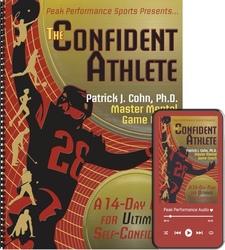
How Does Self-Talk Affect Your Game?
Too often, athletes are dismissive of self-talk. Either they think self-talk doesn’t really impact performance, or your self-talk is relatively unchangeable.
However, language has a profound impact on athletes. Has a parent or coach ever told you, “You are not good enough?” Have you ever been labeled as “lazy”? Has an important figure in your life said, “You are failing to live up to your potential”?
Did any of those comments improve your confidence, enhance your self-image, or leave you feeling more positive about yourself?
Most likely, those opinions contributed to low confidence, a poor self-image, a lack of motivation, and underperformance.
To make matters worse, when you make negative statements about yourself or criticize yourself internally, the impact is amplified.
Negative self-talk impacts your mental game in several ways:
- Constant negative internal dialogue slowly chips away at your confidence.
- Negative self-talk breeds performance anxiety and fear of failure.
- When you constantly put yourself down, you will feel mentally exhausted, emotionally drained, and physically tired.
- When self-criticizing during competitions, you are not focusing on what you should be doing in the moment to be maximally productive.
- Negative thoughts slow your reaction and interfere with decision-making during competitions.
- When you dwell on mistakes or bad games, the result can be longer slumps or inconsistent performance.
If you tell yourself something long enough, you will believe it. However, the reverse is also true. If you tell yourself something reassuring, positive, or productive, your confidence will grow, you will feel less anxious during competitions, and your game will significantly improve.
Positive self-talk does not mean lying to yourself but telling yourself objective facts such as, “I’m a hard worker,” “I will not let a bad performance beat me,” or “I got what it takes to improve my game.”
Positive self-talk focuses on your strengths, successes, and positive qualities. When you choose to focus on positive, productive thoughts, you will achieve positive results.
UCLA center Lauren Betts had an epic year, averaging 20.2 points, 9.5 rebounds, 2.9 blocks, and being named a 2025 All-American and Naismith Defensive Player of the Year.
Bettts’ confidence was displayed throughout the 2025 NCAA Tournament as she helped lead the Bruins to the semifinals. Although, Betts has admitted she struggled with confidence in the past.
UCLA head coach Cori Close stated that confidence has previously been a mental block for Bettts.
CLOSE: “Every young person has to find what their roadblocks are, and hers has been confidence. Hers has been being too hard on herself and not believing how worthy she is.”
Betts knew she had to work to replace her negative thoughts with more positive ones.
BETTS: “I think I just kind of finally came to a conclusion, ‘What you were telling yourself [the negative thoughts] … obviously did you no good and you have to be better for yourself.’”
Changing your self-talk will not happen overnight. You need to commit to work to rewire your thoughts constantly.
For example, before each game this season, Betts wrote affirmations such as “You are amazing,” “Be confident,” and “You got this” on the scouting report she received before each game.
Shifting from negative to positive self-talk isn’t about ignoring weaknesses. It’s about recognizing your strengths and giving yourself positive information to help you perform better during practices and competitions.
Your self-talk is one of your most powerful tools as an athlete. The words you say to yourself, whether positive or negative, constructive or destructive, impact your confidence, focus, energy, and performance.Before every practice or competition, write down 1-2 positive affirmations in a visible place. Messages such as “I’m unstoppable,” “I got this,” or “Keep pushing forward” help build confidence and improve athletic performance.
Related Sports Psychology Article
- How Athletes Can Use Self-Talk for Performance
- How this Self-Talk Hurts Athletic Potential
- How Self-Talk Can Help You Rebound
The Confident Athlete (Digital Download)

“The Confident Athlete” audio and workbook program helps you feel confident before you walk onto the field, track or court. You discover how to have stable and proactive confidence so you can think like a champion.
“I just finished ‘The Confident Athlete Program.’ Improving confidence is a never-ending process. I think that confidence boosting is an awesome area. Having a daily mental plan for mental “work outs” can turbo charge anyone’s confidence level…. Studying almost all of Dr. Cohn’s mental game materials gives me a real EDGE over my competitions and most importantly – a boost in my daily life.”
~Radek Sefcik, Peak Performance Sports Customer

